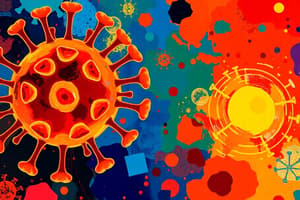Podcast
Questions and Answers
What is the primary function of antibodies during an immune response?
What is the primary function of antibodies during an immune response?
- To create antigens.
- To stimulate the production of red blood cells.
- To produce memory cells.
- To identify and destroy pathogens. (correct)
Why does the immune system respond more quickly to a second exposure to a pathogen?
Why does the immune system respond more quickly to a second exposure to a pathogen?
- Because memory cells immediately produce the required antibodies (correct)
- Because the body has developed an allergy to the pathogen.
- Because the pathogen is weaker the second time.
- Because the body produces more lymphocytes than before.
Which of the following best describes passive immunity?
Which of the following best describes passive immunity?
- The body develops memory cells after the initial infection.
- Antibodies are provided from an external source. (correct)
- The body produces antibodies to fight off pathogens.
- The body doesn't react to pathogens.
How do vaccinations provide active immunity?
How do vaccinations provide active immunity?
What type of cells are responsible for providing long-term immunity?
What type of cells are responsible for providing long-term immunity?
How does breast milk provide passive immunity to a baby?
How does breast milk provide passive immunity to a baby?
Why is passive immunity considered temporary?
Why is passive immunity considered temporary?
Which of the following correctly describes the process of a vaccination?
Which of the following correctly describes the process of a vaccination?
Flashcards
Active Immunity
Active Immunity
The body produces its own antibodies to fight off pathogens.
Passive Immunity
Passive Immunity
Antibodies are provided from an external source, like breast milk or injections.
Memory Cell
Memory Cell
A specific type of lymphocyte that remembers a pathogen and allows for a faster immune response upon re-exposure.
Vaccination
Vaccination
Signup and view all the flashcards
Immune Response Lag
Immune Response Lag
Signup and view all the flashcards
Immune Response Booster
Immune Response Booster
Signup and view all the flashcards
Antibody
Antibody
Signup and view all the flashcards
Immune Response
Immune Response
Signup and view all the flashcards
Study Notes
Immune Response
- Pathogens invade the body, triggering lymphocytes to produce antibodies for destruction.
- Each pathogen needs a specific antibody.
- Initial infection takes time for the immune system to identify the correct lymphocyte for antibody production.
- Pathogens replicate and cause illness during this initial response time.
- Memory cells form after initial infection, recognizing the pathogen on re-exposure.
- Memory cells accelerate the immune response by immediately producing antibodies upon subsequent exposure.
- Memory cells provide active immunity.
Active vs. Passive Immunity
- Active immunity results from the body producing its own antibodies to combat pathogens.
- Passive immunity involves receiving antibodies from an external source (e.g., breast milk, injections).
- Passive immunity is temporary because the antibodies are not sustained indefinitely.
Active Immunity
- Acquired through infection or vaccination.
- Vaccinations expose individuals to weakened or inactive forms of pathogens, inducing memory cell production without causing illness.
- Vaccination results in active immunity.
Passive Immunity
- Obtained through antibody injections or breastfeeding.
- Rabies treatment often involves injecting antibodies directly into the body.
- Breast milk provides antibodies to infants.
Memory Cells
- Produced during the initial infection.
- A specific type of lymphocyte.
- Memory cells enable faster responses to subsequent encounters with the same pathogen.
Vaccination
- Weakened or inactive pathogens are introduced into the body during vaccination.
- This process stimulates the immune system to develop memory cells, fostering active immunity without causing disease.
- Vaccinations can be administered via injection or orally.
Exam Help
- Lymphocytes generate memory cells during the initial infection, offering active immunity.
- Memory cells facilitate a quicker immune response to a subsequent infection.
Studying That Suits You
Use AI to generate personalized quizzes and flashcards to suit your learning preferences.




